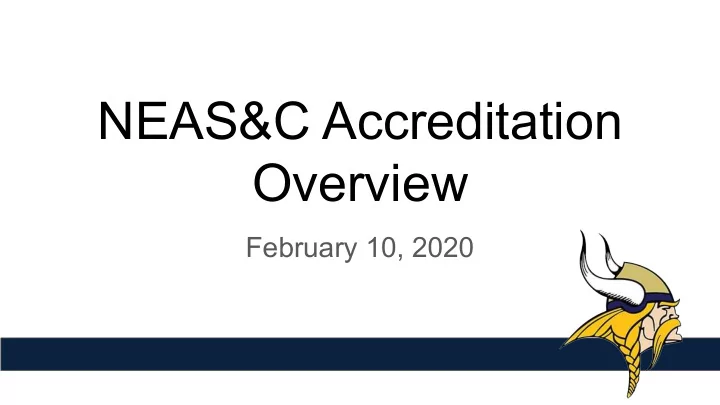

NEAS&C Accreditation Overview February 10, 2020
Presentation Overview - NEAS&C Accreditation Process - WHS Accreditation Timeline - Collaborative Conference Visit - Commendations - Collaborative Conference Visit - Priority Areas for Growth - Action Plans and Current Status - Accreditation Next Steps
New England Association of Schools and Colleges Accreditation (NEAS&C) Overview - Grouped into five specific standards, the NEAS&C guidelines serve to demonstrate that member schools are conducting themselves in a way that results in good teaching and learning. The emphasis during visits is on evidence-based evaluation, direct observation of classroom practice, and interviews with stakeholders. Evaluation is not based on adherence to MA curriculum frameworks, nor on WHS’ results on any standardized tests or the town’s demographics. - The award of Accreditation signifies that the school has met the Standards at an acceptable level and is committed to maintain those Standards.
Timeline Last Accreditation Visit Training Collaborative Conference Visit Decennial Visit WHS was granted accreditation, Principal and Steering committee Team visits WHS. Following the NEAS&C Accreditation team placed on warning status due to trained on Collaborative visit, the CC team generates the visits WHS antiquated school facility. Conference Visit Conference report. 2013 2018 2020 2011 2017 2019 2021 Progress Update Period Self-reflection process begins Action Plan Developed in Response to Priority Areas for Several follow progress reports Steering Committee leads WHS Growth submitted to the NEAS&C on Faculty in self-reflection process current status of the school. (evidence gathering). Self-Reflection Report is completed.
Collaborative Conference Visit - Commendations - the overarching school culture of caring for students - the safe environment created for students, which supports them socially and emotionally - the positive, respectful, and caring relationships between faculty and students - the high standards for civic engagement demonstrated through the community service requirement - the innovative project-based electives that provide learners with real-world skills and generate a love for learning - the various opportunities for project-based learning - the feedback provided through 1:1 or small group verbal communication or technological communication between teachers and students to support learning - the technology integration efforts, which are driven through teacher initiative, to support learning
Collaborative Conference Visit - Commendations - the creative methods used to provide a variety of elective courses, despite fiscal constraints the community and business partnerships that support authentic learning experiences - the annual wellness week program, which promotes many aspects of student health and well-being - the focus on communication with the parents of English learner students - the Life Skills mentorship program, which benefits all students involved and the greater school community - the new state-of-the-art school facility, which was designed to support high quality programs and services - the protocols that are in place to ensure effective responses in crisis situations and ensure the safety of students, staff, and visitors in the event of an emergency - the positive working relationship between the school and the police department
Collaborative Conference Visit - Priority Areas for Growth - Vision of the Graduate : develop a written document describing the core values, beliefs about learning, and vision of the graduate so that they drive student learning, professional practices, learning support, and the provision and allocation of learning resources - Curriculum : write the curriculum in a consistent format for all courses in all departments that includes units of study with guiding / essential questions, concepts, content, and skills; instructional strategies, and assessment practices - Library Media Specialist : provide library/information services that support student learning from adequate, certified/licensed personnel - Intervention Strategies : provide appropriate intervention strategies to all students to support their academic, social, and emotional success
Vision of the Graduate (Standard 1, Foundational Element 1.2a, Principle 1.2) Action Plan: - The steering committee has redefined the WHS Vision of the Graduate to align with our current Student Learning Objectives. This enables teachers to assess and grade students on their progress towards this vision. Using the 4 student expectations for learning, we assess student progress on a quarterly basis. Current Status: - The redefined vision is currently in its final stages before presentation to faculty, staff, and school site council.
Curriculum (Standards 1, 2, Foundational Element 2.2a, Principles 1.1, 1.4, 2.2) Action Plan: - Staff are currently working to standardize written curriculum across WHS’ many departments and courses. Starting in Fall 2019, WHS embarked on a full-scale examination and revision of its curriculum materials using the Understanding by Design (UbD) template. Staff work in this area during professional development days and common planning time. Current Status: - We have established timelines to ensure that this work continues through the Decennial visit, though the progress WHS is already making will satisfy NEAS&C.
Library Media Specialist (Standards 4, 5, Principles 4.4, 5.3) Action Plan: - We are currently addressing NEAS&C’s requirement for a certified LMS. Given the rapid changes in the field of information science, WHS wants to make sure the right hire is a person prepared not simply to manage books, but to assist students with all their research needs and, preferably, to help teach classes. Current Status: - We are crafting a job description by soliciting input from administrators statewide dealing with a similar need. Budget planning is also a consideration.
Intervention Strategies (Standard 4, Principle 4.1) Action Plan: - The administration has streamlined the SST referral process and formally implemented the DCAP. Current Status: - The administration has prioritized access and understanding of the referral process with teachers and worked with student support team members to communicate roles, responsibilities, and expectations.
Next Steps Priority Areas for Growth - Focus on priorities outlined in Collaborative Conference report in anticipation of visit in 2021 Decennial Visit (Spring 2021) - The emphasis during NEAS&C visits is on: - evidence-based evaluation - direct observation of classroom practice - interviews with stakeholders (teachers, students, parents) Accreditation Decision (Summer 2021)
Questions?
Thank you!
Recommend
More recommend